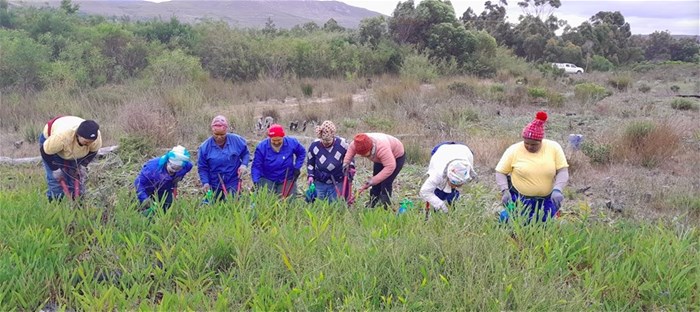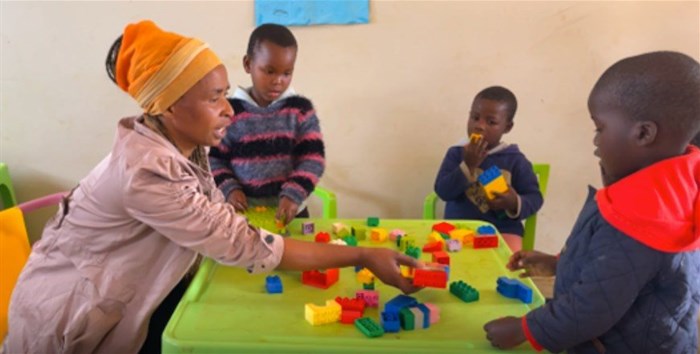
The lives of a 34-year-old Bela Bela (Limpopo) resident, a passionate educator in the KwaBonda Village in the Eastern Cape and 10 women in the Overberg Region, have been turned around through the Social Employment Fund (SEF). From being unemployed, they are now on a journey towards creating a better life for themselves, their families and their community. They are part of the 65,000 participants currently benefiting from the SEF.
In October 2022, Lucas Mokhadi joined the Social Employment Fund (SEF) project through the Seriti Institute, a food security social enterprise. Previously unemployed, he learned basic urban farming skills, which enabled him to start growing his own vegetables, saving him money on his monthly grocery budget. In addition, he was taught various soft skills, like interview techniques, to boost his confidence.
As a SEF participant, Mokhadi worked at the Khabele Primary School in Bela Bela doing garden maintenance. Duties included planting, irrigating and harvesting vegetables that were donated to community members, local non-profit organisations and schools. For this he earned a monthly stipend, with which he was able to supplement his household income and provide a degree of immediate relief and food security for his wife and three school-going children. The SEF stipend also helped pay for data to look for jobs online and transport money to attend interviews. Resources taken for granted by many but, for him, a game changer. This ultimately secured him a permanent role as a clerk at the Department of Home Affairs.

Driven by her passion for young children, Khanyisile Mpethwa established Zibanzini, an early childhood development (ECD) centre in KwaBonda to cater for the needs of young children in her community. A large part of the success of Zibanzini came about when it joined the SEF programme and received a starter kit of toys, educational materials and basic training that helped improve the children’s learning experience. This was facilitated through Impande as the social implementing partner. Last year, important upgrades to the centre were made and now, with added financial security, Zibanzini will transition out of the SEF programme to become self-sufficient.
In the case of Princess Kutuka and her team of 10 women, the SEF in partnership with Brownie Points, provides funding for eight days’ worth of work each month, for them to clear invasive plant species from the fynbos landscape in the Overberg. This income, via a stipend, has allowed them to take care of their children and send them to registered ECD centres and schools.
Social employment is premised upon ‘work for the common good’ by remunerating activities that contribute to community upliftment in areas like education, food security and nutrition.
As part of the Presidential Employment Stimulus (PES), SEF looks to provide temporary work for 65,000 previously unemployed people during which time they learn valuable skills and earn a stipend. Unlike financial assistance in the form of a social grant, a stipend is paid in exchange for participating in work, contributing to specific programmes and skills development.
Administered by the Industrial Development Corporation (IDC), SEF is implemented by 36 civil society organisations across the country. The IDC recognises that gainful employment is not just about financial stability but also about providing people with a sense of purpose, dignity and the opportunity to contribute meaningfully to society.
IDC SEF programme manager, Bhavanesh Parbhoo, says: "So many young South Africans leave the education system without any basic tools needed to find employment, so remain trapped in poverty. And, for those who do complete school, job opportunities are few, with most employers demanding work experience. The SEF programme is providing an opportunity to change this narrative.
"It has helped unlock significant positive changes in many people’s lives, by giving hard working individuals a helping hand which, in turn, empowers livelihoods and uplifts communities."
Businesses, cooperatives, nonprofits and community-based organisations are collaborating to generate and sustain a positive impact through creating jobs and developing skills, giving people access to participating in the economy.
The SEF is currently in its second phase of implementation. The programme's uniqueness lies in its dual role of creating employment and generating social impact, addressing SA’s unemployment by harnessing the power of civil society. This programme is funded through our national budget until March 2024, after which its funding is uncertain.